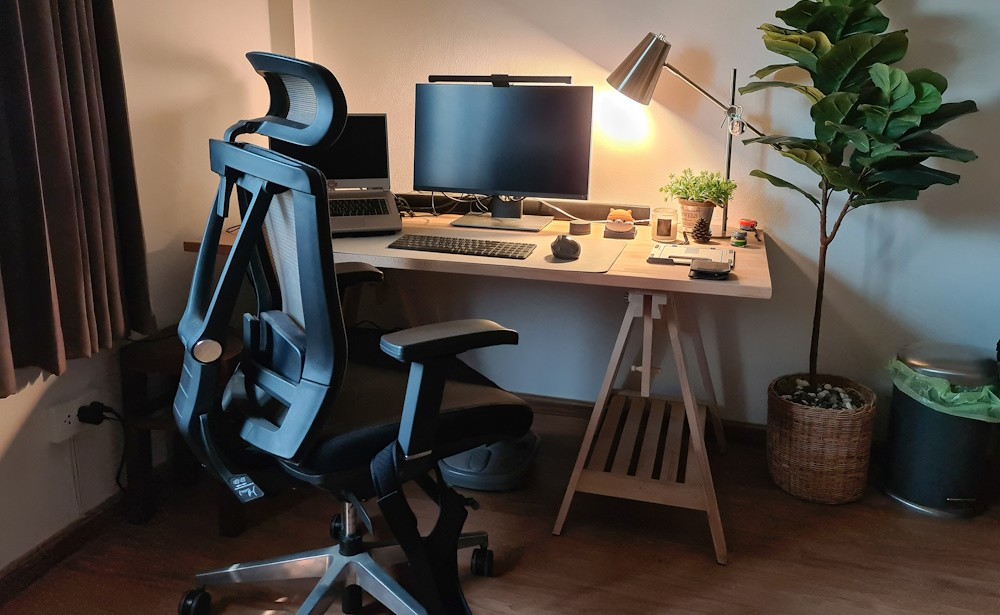Ergonomic Furniture and Other Practical Solutions for Mitigating Work-Related Orthopedic Issues
The modern workplace has evolved dramatically over the years, with technology becoming an integral part of our daily professional lives. While these changes have brought increased efficiency and convenience, they have also presented a new set of challenges, particularly in the realm of orthopedic health.
The effects of poor ergonomics and prolonged periods of inactivity at the office can lead to work-related orthopedic issues. Additionally, there are many people who remain on a hybrid or work-from-home schedule, meaning the onus is on them to create a home office environment that’s ergonomically friendly.
In this blog, we’ll explore the importance of ergonomics and orthopedic solutions in the workplace to help with pain management and promote overall well-being.
Ergonomics Defined
Ergonomics is the study of people’s efficiency in relation to their work environment. There are numerous factors that can affect ergonomics, from how a person sits to the type of chair they choose to sit in. Typically, ergonomists are concerned with creating ergonomic solutions that prevent or resolve workplace-related orthopedic issues, such as low back or neck pain. For example, an ergonomist may design a chair with the specific intent to promote better posture.
When evaluating a specific job function or task, ergonomists are concerned with the following three ergonomic stressors:
- The effort required to complete the task.
- The type of posture adopted while completing the task.
- The repetitiveness of the task.
For example, a person who is required to cut sheet metal using handheld tools is at a high risk of developing an orthopedic issue in their hands and wrists. An ergonomist would develop an ergonomic solution that reduces some of the force required by the sheet metal worker, thus, helping with pain management and mitigating carpal tunnel syndrome.
Proper ergonomic design and innovations can significantly reduce the risk of musculoskeletal disorders and other orthopedic issues that arise from prolonged periods of poor posture and repetitive movements.
Common Work-Related Orthopedic Issues
According to the World Health Organization (WHO), approximately 1.7 billion people are afflicted by one or more musculoskeletal conditions worldwide. These conditions result in workers’ compensation claims, reduced productivity, workplace dissatisfaction, and other issues that negatively impact day-to-day operations. The following are some of the most common orthopedic issues that ergonomic solutions aim to resolve.
Carpal Tunnel Syndrome
Often attributed to poor ergonomics at computer workstations, carpal tunnel syndrome affects tendons in the wrist and hand. It can lead to numbness, tingling, pain, and reduced function.
Low Back Pain
Prolonged sitting, particularly in non-ergonomic furniture, can cause low back pain, a common and debilitating orthopedic issue.
Neck and Shoulder Pain
Incorrect monitor positioning and poor chair ergonomics can result in neck and shoulder pain, leading to tension and discomfort.
Repetitive Strain Injuries (RSIs)
Repetitive tasks, such as using a hammer or similar tools, can cause repetitive strain injuries in the wrist, forearm, and hand.
Sciatica
Prolonged sitting with poor posture can compress the sciatic nerve, leading to sciatica, which is characterized by radiating pain, difficulty moving, weakness, and loss of sensation.
Orthopedic Solutions for a Healthier Workplace
Those who have orthopedic issues related to workplace conditions or a specific job function no longer have to suffer in silence. There are numerous ergonomic and orthopedic solutions that help with pain management and provide relief.
Employee Education
Orthopedic solutions start with employee education. Providing training and resources on proper ergonomics and orthopedic health can empower employees to take care of their physical well-being.
Workplace Assessments
Conducting workplace assessments to identify potential orthopedic risks and make necessary adjustments is vital for employee health.
Ergonomic Furniture
Investing in ergonomically designed office furniture, such as adjustable chairs and desks, can promote healthy posture and reduce the risk of orthopedic issues.
Proper Monitor Placement
Ensuring that computer monitors are at eye level and positioned at arm’s length helps prevent neck, shoulder, and elbow strain.
Regular Breaks and Stretching
Encouraging employees to take regular breaks and engage in stretching exercises can alleviate muscle tension and reduce the risk of orthopedic problems.
Ergonomic Accessories
Items like keyboard trays, footrests, and monitor stands can enhance the ergonomics of workstations.
The Benefits of Implementing Ergonomic and Orthopedic Solutions
Creating a workplace that prioritizes ergonomics and orthopedic solutions yields numerous benefits, including:
Increased Productivity
Pain and discomfort are huge distractions. When employees are healthy, comfortable, and pain-free, they are more focused and productive.
Better Workplace Attendance
By preventing orthopedic issues, companies can reduce employee absenteeism due to illness or pain-related orthopedic issues.
Enhanced Employee Satisfaction
A comfortable and supportive work environment fosters job satisfaction and employee retention.
Lower Healthcare Costs
Fewer orthopedic issues mean reduced healthcare expenses, including fewer claims for workers’ compensation.
Support Your Workforce with Ergonomics
Prioritizing ergonomics and orthopedic solutions in the workplace is a win-win approach. Employees experience improved well-being, while companies benefit from increased productivity and reduced costs associated with orthopedic issues.
By creating an environment that fosters healthy posture and movement, businesses can ensure their workforce remains pain-free and focused, ultimately contributing to a thriving and successful workplace.
Those who wish to learn more about orthopedic solutions or who require an examination to diagnose an orthopedic problem should contact Mid-America Orthopedics. During your appointment, we can discuss pain management options for your specific issue and recommend specific ergonomic solutions that will provide relief.
Call us at (316) 630-9300 or email us using the contact form on our website.

